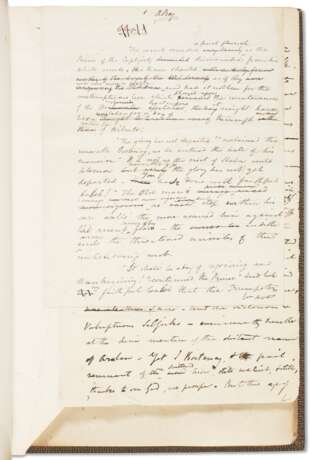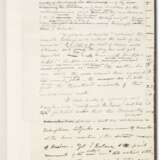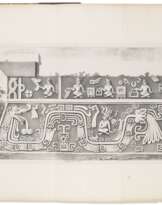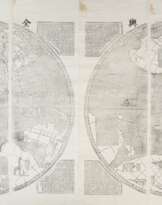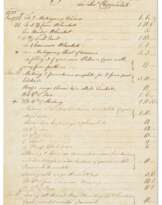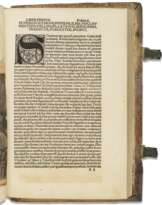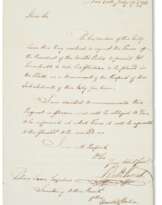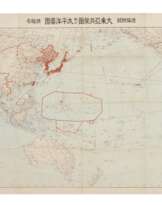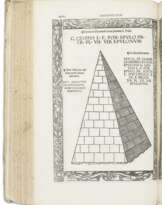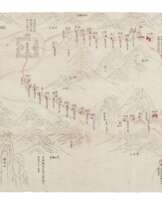ID 627627
Lot 138 | Alroy
Estimate value
$ 30 000 – 50 000
Two bound volumes, approx. 397 leaves each mounted on a stub at gutter, various sizes (373 x 225 mm to 323 x 201 mm), both sides.
The complete autograph working manuscript of Alroy, containing numerous authorial corrections, revisions, and deletions throughout. Disraeli, politician, prime minister, and novelist, had spent the years 1830-32 on a tour of the Middle East, including a seminal week in Jerusalem. It was on this tour of the Holy Lands that Disraeli developed a strong sense of cultural relativism. While Disraeli was baptized into the Christian church at age 13, at the request of his father, a Voltairean sceptic, this was done mostly for practical reasons (Jews still faced significant legal discrimination in England at the time and could not own land, attend universities, or hold political office). Nevertheless, Disraeli maintained a deep interest in Judaism and Near and Middle Eastern affairs and culture all his life. The present manuscript, set in the medieval Middle East, concerns a 12th-century Jewish leader, David Alroy, who gained a significant following when he proclaimed himself the Messiah who would return the Jews to Jerusalem. He led an attack on the city of Amadiya—which is today in Iraqi Kurdistan—where he was defeated and killed. The novel deals with "the dilemma faced by a Middle Eastern Jew who sought fame, but who faced conflicting ideals: between establishing a purely Jewish regime and a larger empire assimilating other religions. The moral of his failure was that a taste for action and the power of imagination were both needed in a leader. Alroy shows Disraeli thinking about problems that were to concern him a great deal in the future; it portrayed 'my ideal ambition'."-ODNB. This is amongst the most personal of Disraeli's novels. He claimed he started the novel during his transformational visit to Jerusalem (folio 7 is on paper with a Britannia watermark dated 1831). According to the Index of English Literary Manuscripts: Volume IV 1800-1900, Part 1 (1982) there is an incomplete later MS. of the novel (part draft, part fair copy) among the Hughenden Manuscripts on deposit at the Bodleian (MS Disraeli dep. 217); an 8-page transcript in that hand of Sarah Disraeli at Princeton; and fair copy and page proof of the preface at the V&A. From the library of Archibald Philip, 5th Earl of Rosebery, himself a Prime Minister (1894-95), who was introduced to his wife, Hannah de Rothschild, by Disraeli in 1868. Provenance: Archibald Philip, 5th Earl of Rosebery (armorial bookplate and Barnbougle library stamp, sold Sotheby's London, 15 July 1975, lot 10) — Saul Shapiro, bookplate.
| Artist: | William Shakespeare (1564 - 1616) |
|---|---|
| Applied technique: | Pencil |
| Artist: | William Shakespeare (1564 - 1616) |
|---|---|
| Applied technique: | Pencil |
| Address of auction |
CHRISTIE'S 8 King Street, St. James's SW1Y 6QT London United Kingdom | |
|---|---|---|
| Preview |
| |
| Phone | +44 (0)20 7839 9060 | |
| Buyer Premium | see on Website | |
| Conditions of purchase | Conditions of purchase |
